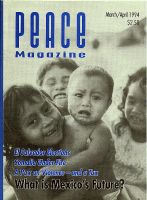
Peace Magazine Mar-Apr 1994, page 28. Some rights reserved.
Search for other articles by Myrna Kostash here
Review
Are you interested in Eastern Europe? Don't know exactly where to start? Do you need to be freed of dull academic interest in what's going on over there? Or would you just like to read a good book for a change? Here's one.
It's about what were once four countries-all of them predominantly Slavic-that have become an indefinite number of would-be states and ministates: some recognized but rickety, others unrecognized but vigorous.
Myrna Kostash says that Bloodlines is "not a book about the revolution,"-about the political changes in the European East-but "a book about memory" (p 1). Yet it is about peoples whose selfconsciousness and visions of their future often derive from their memories of the past. Hence, past-in-the-present and past-in-the-future are alive and well in the political grammar of those parts. Bloodlines is a book about and of memory, touching upon its strength, its absence, and its resurgence.
Take Czechoslovakia, for example, the first of the four countries that are the subjects the book. By 1988, it seemed that nobody remembered the "Czech Spring" of 1968 and the August military invasion of the Warsaw Bloc forces. As a sunbathing schoolgirl, put it, "It was an explosion of anti-socialist elements." Czechoslovak memory was at an ebb in 1988. "It feels oppressively odd to be a foreigner here and the only one remembering," writes Kostash. She was not the only one, though, as Bloodlines shows. A dissident underground lived on, preserving memory-bloodline of all bloodlines-that roared back to life in 1989, with well-known consequences. Kostash indicates where that change came from.
Or take Yugoslavia, the heartland of the Balkans, "the terrain where the dreadful East exhausted itself." In the mideighties "Yugoslavia was welcoming, open, sexy," says Kostash, but it was becoming obviously precarious too, "a state of dramatically different peoples who have shared a violent history when they have shared it at all." The violent past came back in 1990-91, from the remoteness of memory where it was kept alive by its followers for decades. Bloodlines talks about those remote events.
Take Poland, that migrant country which had been shoved around, abolished, and resurrected time and time again throughout history. The land of the living past, where people in 1988 believed that Praga, a suburb of Warsaw was "the frontier of Europe," as Kostash was told. "There is where Asia begins," added her interlocutor. Poland is also a land of proud people, who can say, and mean it, "We don't care about life. The pig also lives. We want a life of dignity."
Finally, take Ukraine, the land of bloodlines that connect Myrna Kostash herself to the original homeland of her grandparents. It's one of the first Slavic countries to rise in history, and among the last ones to return to it as a collective political subject. Surviving in "ethnos, the place everybody comes from." Ukraine as a country represents less a state, perhaps, than the "collective reawakening and restoration of...memory"-the memory of Cossacks, raids, plunder, murder, rebellion, rape, defeats, victories, destruction-and survival. Not through the mighty elites but by means of memory kept by the poor and the downtrodden.
Bloodlines is a book about all that and more, sometimes sad, at other times funny, but mostly tragi-comic. For example, Kostash recalls waiting in a Ukrainian hotel in 1988 "for the bottle of champagne to cool off a bit in the toilet bowl."

Peace Magazine Mar-Apr 1994, page 28. Some rights reserved.
Search for other articles by Myrna Kostash here